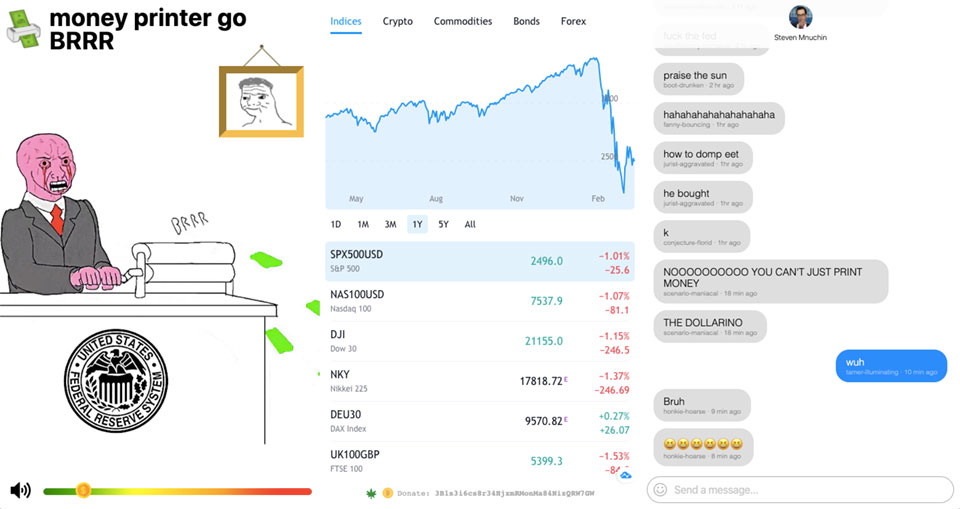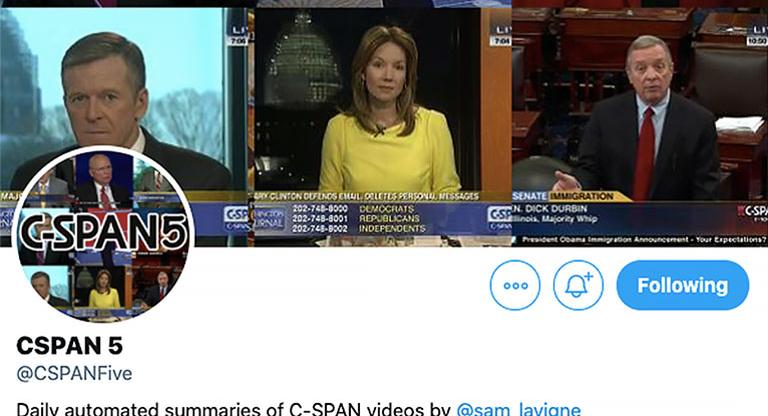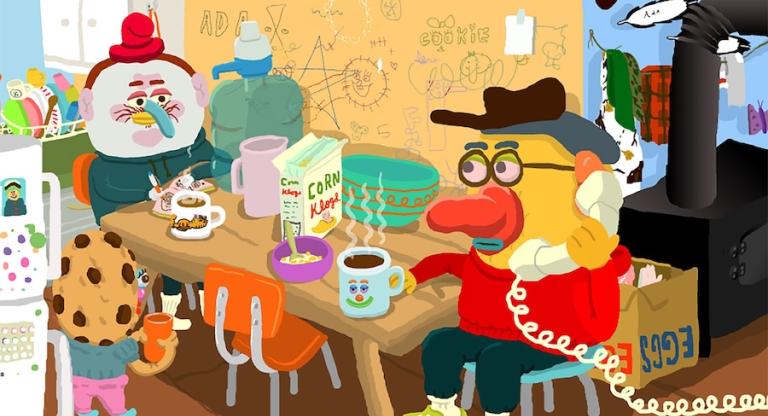I first saw the printer go brrr meme on Twitter in mid-March. According to knowyourmeme.com, it was first tweeted by @femalelandlords on March 9, but I must have seen it days later. The first meme shows two wojacks — digital line-drawings of sad people — arguing over the Federal Reserve’s initial $1.5 trillion injection of money into US markets. The younger wojack, whose bowtie shows the colors of the anarcho-capitalist flag, argues that pumping money into the stock market and changing interest rates are illegitimate strategies for handling the natural variations in the market. The older, Federal Reserve wojack responds simply: “haha money printer go brrrrr.”
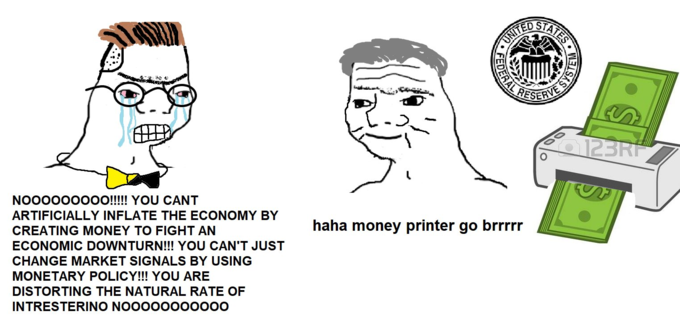
Since then, the format has expanded, and even been applied retroactively to memes that depict various historical events in which mechanical realities are unbothered by moral or intellectual reservations. A website, https://moneyprintergobrrr.com/, ludicrously animates the meme’s institutional desperation and pegs it to a live feed of the stock market tanking.
The meme has a few alternate forms, depending on who is crying. The original and most common: someone is frustrated when the rules they’ve internalised about the distribution of symbolic resource — mostly money, but they could be material goods as well — are revealed to be governed only by a machine that “go brrr.” But others show individuals whose faith in the baselessness of economic functionality, their belief in the printer going brrr, is shown to be misguided. These poles are precisely what has become so engrossing about the “go brrr” meme: its double-edged ruthlessness. “You can’t just do that!” doesn’t matter: printer go brrr. But that nihilism isn’t even productive. Of course the money printer goes brrr. So what?
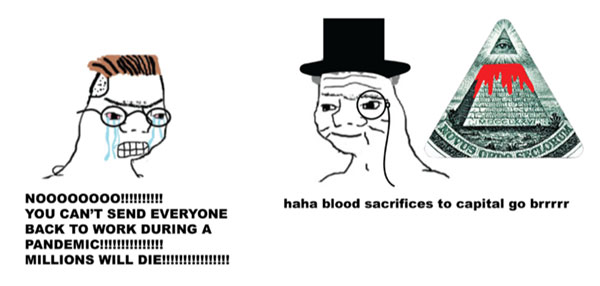
The memes have emerged as the current crisis’ most effective illustrations precisely because of their nihilism. In the United States it took less than two weeks to transition abruptly from the country’s greatest collective challenge to a presidential endorsement of genocidal sacrifice in the name of a fictitious marketplace, a ludicrous pronouncement capped off by the passage of a federally sanctioned corporate slush fund under the guise of a national rescue passage. Unsurprisingly, it was a Presidential Zoom meeting with billionaire investors that resulted in the federal government’s death drive to reopen for business. There are some who say that, in lieu of our failing government, private industry will pick up the slack. Where are the billionaires? Some have asked, incredulously. I have one idea. In the United States, we have been told for decades that private industry should replace federal responsibility. But if you look to private industry to fulfill a social contract shirked by the government, you’ll be disappointed. Their only interest is profit. And if you replace private industry with public institutions, if you replace profit with culture — you will likely be even more disappointed.
If the President of the United States tries to force the nation back to work before the virus is contained — as he continues to threaten — state governors can still obey public health experts and maintain local lockdowns. But to do so, they will need federal funds. As the precedent set by the current administration following ecological disasters in Puerto Rico over the past few years has shown, the state is more than willing to deny federal funding to its colonies in times of crisis. From surveillance to incarceration, state policies in the colonies have always been dry-runs for the violent economic and juridical policies that become commonplace in the metropole. What will happen if New York State doesn’t reopen on the Presidential-Wall Street timeline? It seems likely the printer will not go brrr.
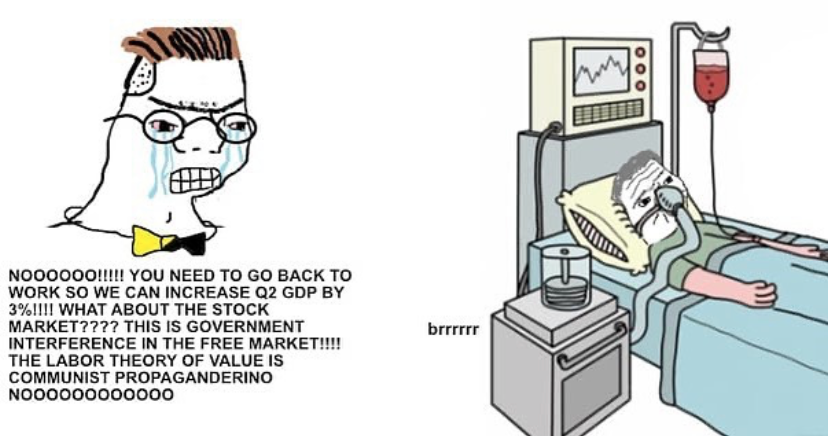
The current crisis is not simply an infectious disease ripping through a global population. It is an illness that outpaces our society’s capacity to offer care. This is a crisis of public health driven by a lack of civic responsibility. American society has no use for any form of care, be it physical or economic. Our government has shown itself — as it did during the AIDS epidemic — to be uninterested in becoming an institution that saves instead of one that kills. Yet the American state isn’t the only organization unwilling to take responsibility for the current crisis, and they shouldn’t be the only one that takes the blame. Today’s capitalist regime is one that exists in all of us: we all negotiate its murderous values, engaging when we must and turning away when we can. How long has every level of American culture harped on about doing more with less, wittingly or unwittingly benefitting the few, deregulating and cutting to turn a $1 into $1.01? How long have American corporations and institutions wanted work without workers? Production without responsibility? How long has the American healthcare industry concerned itself with denying care to create profit? Corporations, institutions, and organizations of all scales in America have played a critical role in allowing these values to become true: whether because of indulgence of or participation in the hollow gig economy, consistent acts of economic and political irresponsibility, and decades of empty sloganeering. These veredictions have existed long before the appearance of the virus COVID-19.
These memes make clear the tacit fact beneath every anxious conversation since mid-March: there is no going back to normal. How ridiculous virtue-signaling careerists look now, when the primary questions for many are: Can I pay rent? When, where, and how will I buy food? How can inane industries pivot to selling the softest sweatpants for working from home with the unemployment rate poised to hit over 30%, lifestyle food-bloggers tout the benefits of fresh produce, neighbors drive eachother crazy doing at home HIIT workouts, all violently denying the that normal patterns of consumption and precarity are dangerously unsuited for today’s crisis. These rituals contribute to a feeling of normalcy when normality is exactly what we should be fighting against. The opportunity to institute radical change founded on physical and economic care and accessibility has never been greater. But as of today — considering the content of the federal government’s heinous first COVID bailout — it seems most likely that this shock-doctrine will result in doubling-down on a necrophiliac form of neoliberal authoritarianism.
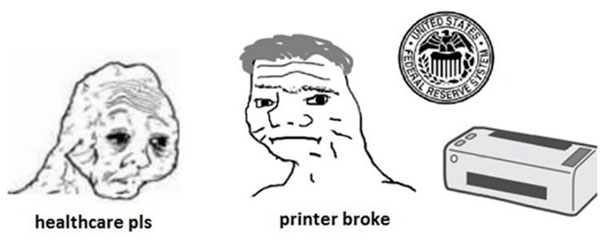
On the other hand, there might still be genuine cause for optimism. But the American empire’s violent twilight won’t change direction on its own. If we want a state grounded in something other than profit and crony capitalism, then we must do everything we can to keep capital from growing under new conditions. Never has the primary directive for the common good been so simple and accessible: stay home. As a result, it has never been easier for a larger portion of the American workforce to participate in a general strike. Will we heed the call? I can see the meme right now: “Noooo!!! You can’t just have a general strike by sitting at home!!!” “Haha. General strike go *silence.*”
